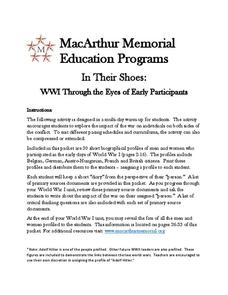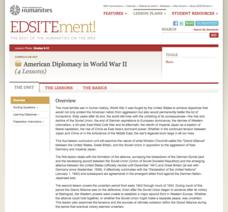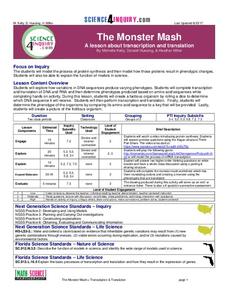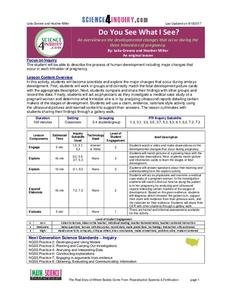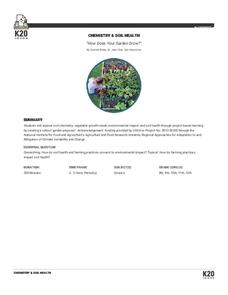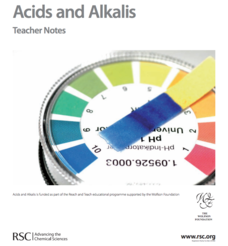PBS
Women's History: Parading Through History
Want to teach your pupils about debate, effective speech techniques, propaganda, and the women's movement? The first in a sequential series of three, scholars analyze real propaganda images from the the historic women's movement, view a...
Howard Hughes Medical Institute
Human Feet Are Strange
Feet are neat! So, if you've already walked the path of examining animal footprints with your class, put them in the shoes of early humans! A well-designed activity incorporates video, discussion, and hands-on learning to demonstrate how...
PBS
NOVA Sun Lab Lesson Plan
Looking for a sun-sational multi-lesson plan full of videos, simulations, and discussion? Introduce your young scientists to all things solar with a four-part hands-on adventure. Pupils learn the basics of solar anatomy, space weather,...
MacArthur Memorial
In Their Shoes: WWI Through the Eyes of Early Participants
Several social activities provide showcase the perspective of many prominent figures in World War I history. Students read an assigned case study about a memorable person and complete several activities to further understand this...
American Press Institute
Introductory News Literacy
Aspiring journalists learn about media literacy, journalism, and the press. Units come complete with handouts, assignment rubrics, notes, and extension suggestions. Each unit also comes with a list of vocabulary words and learning...
National History Day
Propaganda Posters of World War I: Analyzing the Methods Behind the Images
The power of a picture. During the events surrounding World War I, propaganda posters were widely distributed in American society to sway the emotions of its citizens. By analyzing World War I propaganda posters in the first installment...
Queen's Printer for Ontario
Evaluating Wartime Posters: Were They Good Propaganda?
"Back Him Up!" Scholars will analyze how World War I posters displayed, on the home front, often attempted to stir up emotions. As they examine the different ways people used propaganda posters during the war, they will create their own...
National Endowment for the Humanities
American Diplocmacy in World War II
The end of World War II saw the world deeply changed over the last few years. Four thorough lessons explore post-war Europe, America, and Asia through reading assignments and discussion questions about the Grand Alliance and the signing...
US Institute of Peace
Simulation on The Cambodia Peace Settlement
Can there be peace in Cambodia? Immerse your class in a realistic negotiation setting during a riveting simulation. Learners assume the roles of key players in a group sparring with an opposing group to try to achieve peace in the midst...
Broward County Schools
Women's Contributions to the United States
Betsy Ross, Toni Morrison, Sacajawea, Amelia Earhart, Maya Lin, Sally Ride, Judy Baca. No matter the subject area or the grade level you teach you will find much to value in a manual that focuses on the contributions U.S. women have...
Science 4 Inquiry
The Monster Mash
Young scientists create monsters by applying their knowledge of transcription and translation. They randomly find the DNA, assign it a codon, and build monsters piece by piece.
Science 4 Inquiry
Genetics, Genetics, and More Genetics: Exploring Independent Assortment and Non-Mendelian Genetics
Two individuals share 99.9 percent of their genetic codes, yet diversity is observed everywhere. Young scientists learn about diversity through hands-on activities and an experiment. They apply the concepts of independent assortment and...
Science 4 Inquiry
Do You See What I See?
In only nine months, a small group of cells grows into a fully developed baby. Pupils learn about the development of an embryo to a fetus to a baby. They identify each step of weekly development. Young scientists look at ultrasounds to...
Science 4 Inquiry
It's Not All Visible
Electromagnetic waves travel though empty space, something no other wave type can accomplish. Young scientists learn more about the entire spectrum of electromagnetic waves. They sort cards and apply their knowledge to create models of...
K20 LEARN
How Does Your Garden Grow?
Seventy thousand different types of soil exist in the United States alone. Young scientists learn about the importance of soil to the food supply. They test soil for a variety of factors and determine the best place to set up a community...
Broadway GPS
The Lion King—The Broadway Musical Study Guide
Musicals have been adapted from stage plays, novels, and movies. With The Lion King, Disney transforms its animated film into show-stopping, live-action musical theatre. The guide Disney provides to accompany a study of the award-winning...
DiscoverE
Design a Shoe
Engage young scientists in a project where high fashion meets engineering! Using foam core and hot glue, partnered pupils design and create a functional, fashionable pair of shoes. Groups then put the footwear through its paces using a...
DiscoverE
Slender Tower Challenge
Looking for an engineering project that will tower above the rest? Try a design experiment that has built-in fun! Groups examine a variety of skyscraper designs, then compete to create their own slender towers. The teacher's guide is...
DiscoverE
LIDAR: Mapping with Lasers
We would be lost without maps! How are they made? Introduce junior topographers to LIDAR technology with a fascinating activity. Set up a mock city, then have learners operate a laser measure to determine the shape of the landscape using...
Royal Society of Chemistry
A Visible Activated Complex Experiment
When was the last time your class saw a catalyst in action? Chemistry scholars observe an activated complex during an engaging experiment. Through both color change and evolution of a gas, individuals gain insight into the...
Royal Society of Chemistry
Acids and Alkalis—Gifted and Talented Chemistry
Looking for a comprehensive plan for teaching acid-base chemistry? Science scholars discover acid-base interactions through a thoughtfully written unit. The resource is divided into paced activities and individual work designed to...
Royal Society of Chemistry
Observing Chemical Changes—Microscale Chemistry
Want to add a wow factor to your current chemical changes lesson plan? Try a microscale experiment with colorful precipitates! Partnered learners conduct 10 single displacement reactions and record their observations.
Royal Society of Chemistry
Equilibria—Gifted and Talented Chemistry
Teaching is a balancing act! Keep things on an even keel with a comprehensive equilibrium lesson plan. The resource covers reversible and irreversible reactions, Le Chatelier's Principle, and the industrial applications of equilibrium...
Centers for Ocean Sciences
Ocean and Great Lakes Literacy: Principle 1
Is your current lesson plan for salt and freshwater literacy leaving you high and dry? If so, dive into part one of a seven-part series that explores the physical features of Earth's salt and freshwater sources. Junior hydrologists...





